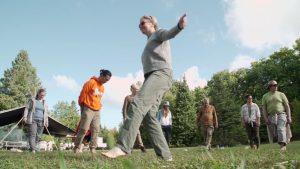6 Considerations for Educators
As you explore nature connection in an educational setting, whether it be as a brand new pursuit or as part of your ongoing development, there will always be changing dynamics to consider. As context, approaches, and practices evolve, educators must be open to continuous learning while maintaining the intrinsic values and benefits of connecting with the natural world. Below are considerations for educators to undertake as they aim to share nature connection with their students and communities.
Consider Your Personal Journey
As an educator, reflect on your personal journey with nature. Developing authentic relationships with the natural world around you can enhance your ability to teach place-based education. Take time to connect deeply with your local environment and community, reflect on your own unique experiences with nature, and pursue relationships that nurture benefits of nature connection. This personal connection can serve as a foundation for inspiring your students and fostering a genuine appreciation for nature in them.
Maintain Connections, Share What You Know
Maintaining a connection with nature requires ongoing effort and intentionality. Share your experiences and knowledge with your students and encourage them to do the same. Create opportunities for students to explore their local environments, ask questions, and reflect on their interactions with nature. By fostering an environment of curiosity and sharing, you can help students build and sustain their own connections with the natural world. In nature connection, the goal as educators is not to have answers to every question but to create a dynamic where students and you yourself can be challenged to approach new learning and ways of knowing.
Foster Mentorship and Continual Learning Through Connection
Mentorship plays a vital role in place-based education. Seek out mentors who can guide you in deepening your understanding of the environment, be a part of your community, and act as a mentor to your students. Emphasize the importance of continual learning and personal growth through connection with nature. Encourage students to seek knowledge from various sources, including community members, local experts, and Indigenous knowledge-keepers, to encourage long-term nature connection practices and benefits.
Respect Knowledge Shared, Both Uplifting and Challenging
Respect is fundamental when engaging with place-based education. When knowledge is shared with you, especially from lived experiences, it is essential to honor and respect that information. Acknowledge the sources of your knowledge, give credit where it is due, and approach all teachings with humility and gratitude. Teach your students the importance of respecting both the natural world and the cultural knowledge that enriches their learning experience.
Indigenous Traditional Ecological Knowledge – Inspiration, Not Appropriation
Indigenous Traditional Ecological Knowledge offers invaluable insights into building deep connections with the living world. Collaborate with Indigenous educators and communities to incorporate their knowledge authentically and ethically. Highlighting the importance of local cultural contexts emphasizes the importance of recognizing practices rooted in Indigenous approaches.

By considering these aspects, educators can begin to effectively integrate place-based education into their teaching practices, creating meaningful and respectful connections between students and their local environments.

Feedback/Errata